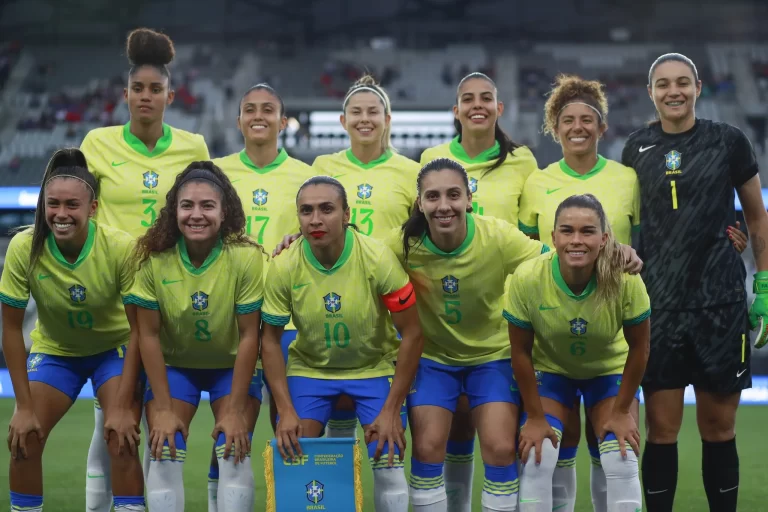The story of women’s football in Brazil is a journey from restriction to recognition. It began under a ban in 1941, when the government deemed the sport unsuitable for women. Still, women continued to play in secret, their love for the game, unshaken.
In the late 1970s, as Brazil embraced social reforms, the ban lifted. This change coincided with a global feminist movement, inspiring Brazilian women to reclaim their place in sports. The 1980s saw the slow emergence of women’s teams and competitions, though they struggled with limited resources and little media attention.
READ MORE
++ Marta Vieira da Silva: The undisputed queen of women’s football
++ Mother, footballer and legend: Cristiane, the veteran Brazilian scorer
++ Hard blow for the Seleção before the preparation matches
First official match
The women’s national team had its first official match on July 22, 1986. Although they lost to the United States, it was a start. The team faced early challenges, such as consistent support and minimal infrastructure.
Yet, their participation in international tournaments like the FIFA Women’s World Cup and the Olympics gradually boosted their profile.
Por elas, e pelas que virão. #2027noBrasil 🇧🇷 pic.twitter.com/fHHyjA1wTl
— Seleção Feminina de Futebol (@SelecaoFeminina) May 17, 2024
By the 2000s, Brazil had become a force in South American women’s football, led by stars like Marta and Cristiane. Their talent drew attention and respect, helping to change how people saw the sport and encouraging a new generation of players.
Marta é a primeira jogadora imortalizada em cerimônia do FIFA The Best!
A primeira entre homens e mulheres a receber a homenagem ainda em atividade. Além disso, o troféu para o gol mais bonito do ano no futebol feminino terá o nome da nossa craque! Parabéns, Rainha! 👑🇧🇷 pic.twitter.com/kBUFPc3SEY
— Seleção Feminina de Futebol (@SelecaoFeminina) January 15, 2024
What changed so far
Today, women’s football in Brazil enjoys a more structured environment thanks to the national league started in 2013. This league increased fans, media coverage, and overall quality. The national team stands as a symbol of excellence, enjoying more recognition and support, even to the point of earning the same payment structure as the men’s team.
Brazil announce that they are now paying the women’s team the same as the men.
“There is no more gender difference.” 🙏 pic.twitter.com/cXnWPEjb62
— B/R Football (@brfootball) September 2, 2020
FIFA rankings
The FIFA women’s world rankings were introduced in 2003, and since then, Brazil has typically fluctuated between these rankings, often remaining within the top 10. Their peak in 2009 reflects a period of strong performance, including their runner-up finish at the 2007 FIFA Women’s World Cup.
Take a look at the highest, lowest and current FIFA rankings of the Brazil women’s team:
- Highest Ranking: 2 (March – June 2009)
- Lowest Ranking: 11 (September 2019; December 2023)
- Current Ranking: 10 (as of 15 March 2024)
Tournament Success
Here’s a comprehensive list of the achievements of Brazil’s women’s national football team:
- FIFA Women’s World Cup:
- Runners-up: 2007
- Third place: 1999
- Olympic Games:
- Silver Medalists: 2004, 2008
- Fourth place: 1996, 2000, 2016
- Copa América Femenina:
- Champions: 1991, 1995, 1998, 2003, 2010, 2014, 2018, 2022
- Runners-up: 2006
- CONCACAF W Championship:
- Runners-up: 2000
- CONCACAF W Gold Cup:
- Runners-up: 2024
- Pan American Games:
- Gold Medalists: 2003, 2007, 2015
- Silver Medalists: 2011
- South American Games:
- Bronze Medalists: 2014
- SheBelieves Cup:
- Runners-up: 2021
- Third place: 2023, 2024
- Torneio Internacional de Futebol Feminino (International Women’s Football Tournament):
- Champions: 2009, 2011, 2012, 2013, 2014, 2015, 2016, 2021
- Runners-up: 2010, 2019
Individual Records and Notable Feats
- Most Caps: Formiga with 234 appearances.
- Top Scorer: Marta with 116 goals.
- Record Victory: 15-0 against Bolivia (1995) and Peru (1998).
- Marta holds the record for the most goals scored at FIFA Women’s World Cups for any gender with 17 goals.
- Hosting the 2027 FIFA Women’s World Cup
The 2027 #FIFAWWC will be hosted by Brazil! 🤩🇧🇷 pic.twitter.com/iPAISNUZmc
— FIFA Women's World Cup (@FIFAWWC) May 17, 2024
Challenges?
Brazil’s women’s football team relies heavily on a few top players like Marta, Cristiane, and Debinha. These players are exceptional, with Marta being one of the best female footballers ever, winning FIFA World Player of the Year six times. However, the trio may dazzle, but it takes a squad to conquer.
To improve, Brazil needs to develop more football talent across the board. Investing more in youth programs and local leagues could help build a stronger pool of players for the national team, making them less dependent on just a few stars, especially when they are close to retirement.
Remembering Zagallo
Sambafoot Series launched a new documentary about the football legend Zagallo. Known as ‘Velho Lobo‘ and as superstitious as it gets, Zagallo helped shape what Brazilian football is nowadays — as a player and as a coach.
Binge the full series, available on Sambafoot’s Youtube channel.



